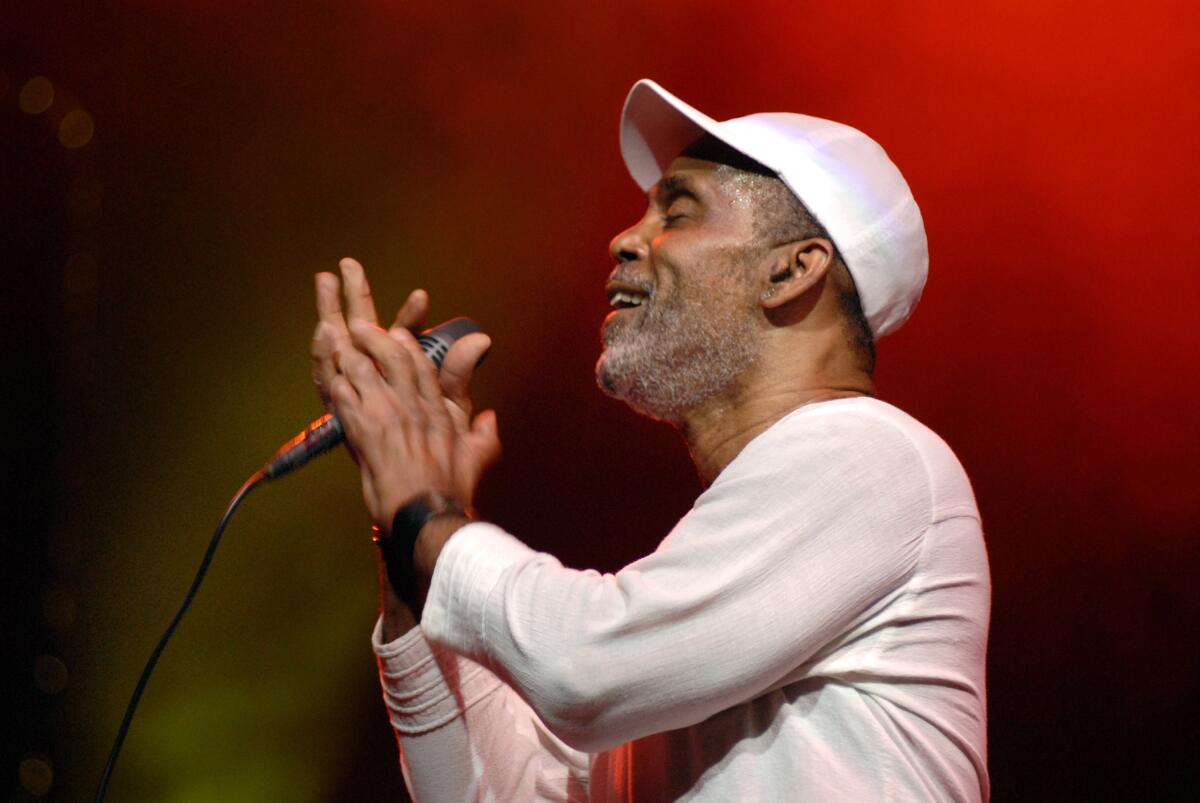When Frankie Beverly, lead singer of the soul band Maze, passed away this week, I thought of the audience on his recordings from one November night in 1980 at Saenger Theater. His album “Live in New Orleans” captured more than a concert. It captured a turning point in history.
Opinion Columnist
LZ Granderson
LZ Granderson writes about culture, politics, sports and navigating life in America.
President Carter had lost his reelection bid barely a week earlier. Nearly 60% of Orleans Parish, where Beverly was recording, voted for Carter. The GDP grew a stunning 4.6% during Carter’s only term, but inflation was 13%, as was the poverty rate. His opponent, Ronald Reagan, blamed social programs and welfare recipients for the economic woes. When Reagan first workshopped that rhetoric, in his 1966 campaign for governor of California, the “war on poverty” had just begun; the overall poverty rate was 17%, but for Black America in 1965 it was more than 40%.
By 1980, Reagan and his party had a clear record of dislike for the war on poverty and those it intended to help. He cut more than $22 billion from social programs within his first two years. And when Reagan left the White House, the county’s poverty rate was back up to its highest since — wait for it — 1965.
Listening now, I know that in New Orleans in 1980, Beverly singing “we’ll get through these changing times” was about all of this and the road ahead. His music was both the calm before the storm and the tool needed to find peace in the middle of it. That is why “Joy and Pain” — the fourth track on the live album — sounds less like an R&B concert and more like a revival.
“Sometimes we go through life and things don’t work out the way you want all the time,” he begins. “As you grow older, you kind of learn to live with the joys and pain of life, y’all .… Can I get a witness to that?”
As a child, I thought I understood what Beverly was talking about in “Joy and Pain.” And then, as Beverly said, you grow older. And with wiser eyes you are more able to see just how painful it must’ve been for parents to not be able to feed their children or keep the lights on.
By the time “Live in New Orleans” was released in 1981, nearly 1 in 7 Americans had plunged into poverty, crack was appearing in major cities and the U.S. divorce rate was at its peak. Beverly’s music kept the Black community’s spirits lifted — much in the way Bruce Springsteen and John Mellencamp became voices for the white working class during this same era.

Frankie Beverly performs at the 2019 Essence Festival at the Mercedes-Benz Superdome on Sunday, July 7, 2019, in New Orleans.
(Donald Traill / Associated Press)
Over and over you can be sure
There will be sorrow but you will endure.
Where there’s a flower there’s the sun and the rain —
Oh, but it’s wonderful, they’re both one and the same.
At one point during the recording, Beverly recalls a story in which someone asked why he chose New Orleans to record a live album. His answer was perfect in its simplicity: “Well, why not, ya dig?” Through the long lens of time, we can now see Beverly’s choice of city was the perfect backdrop.
After enslavement came the New Orleans massacre of 1866, the Race Riot of 1900 and other terrorist attacks that left countless dead and destroyed Black businesses and homes. When construction of Saenger began in 1924, there was prosperity in New Orleans, but Jim Crow laws kept Black people disenfranchised.
And then just two months after the theater opened, the Great Mississippi Flood of 1927 devastated the region, causing more than $1 billion in damages — equal to a third of the federal budget at the time.
The flood killed more than 1,000 people and displaced 700,000 others. Many of the victims were descendants of the enslaved who had been forced into sharecropping. About a mile from Saenger is the restaurant where civil rights figures such as Thurgood Marshall and Martin Luther King Jr. would pray and eat as they met with local leaders, strategizing on how to dismantle oppressive laws.
This rich and textured history — each turning point — all contributed to the shaping of the New Orleans community and is reflected in the audience voice heard on that 1980 recording. The hits were established before Saenger. What made the album transformative was confirmation of a shared experience and shared resilience, expressed by those who attended.
The summer “Before I Let Go” first hit the airwaves, the death of Ernest R. Lacy would spark months of protest in the streets of Milwaukee.
Lacy, a 22-year-old Black man, was helping his cousin paint his apartment when he decided to walk to a store to grab a bite to eat. Police confronted him, claiming he fit the description of a rape suspect. Lacy died while in their custody. The woman who had been raped later identified her attacker, and he was convicted. Lacy was innocent.
During times in which it was easier to give in to hate and despair, Beverly advocated for love and resolve with a string of timeless classics that can be heard at any cookout worth fighting 405 traffic to get to. A soothing balm full of wisdom and warmth, Maze concerts were part family reunion, part community therapy.
Beverly received lifetime achievement awards from both BET and the NAACP. His career stretched across eras, his voice led to nine gold records, and his music influenced generations.
But, to the shame of the Recording Academy, he never received a Grammy. The Grammys could still correct that oversight and honor Beverly as he should be. Because it wasn’t talent that limited Beverly’s reach; it was the industry.
Black people had created the blues long before Mamie Smith walked into the studio in 1920 to record what’s considered the first blues record. The success of Smith’s recording led to “race records,” which led to Billboard having a list of the “most popular records in Harlem” in the 1940s.
Motown was ignored during award season for decades. By 1985, the American Music Awards had landed on a “Favorite Black Single” category as a way to keep everyone happy. It was decades after decades of trying to contain something as organic as music, like forcing an amoeba to hold a shape.

R&B legend Frankie Beverly is retiring from his post as the lead singer of ‘Maze’ after a farewell tour kicking off in March.
(Frank Mullen / Associated Press)
It’s still a struggle for the industry — so much so that the nation was riveted early this year when Tracy Chapman took the stage with Luke Combs and together, with the help of a story about poverty in America, they reminded us all that music was never meant to keep us apart.
It’s there to hold us together.
Beverly understood that as well as anyone.
@LZGranderson



